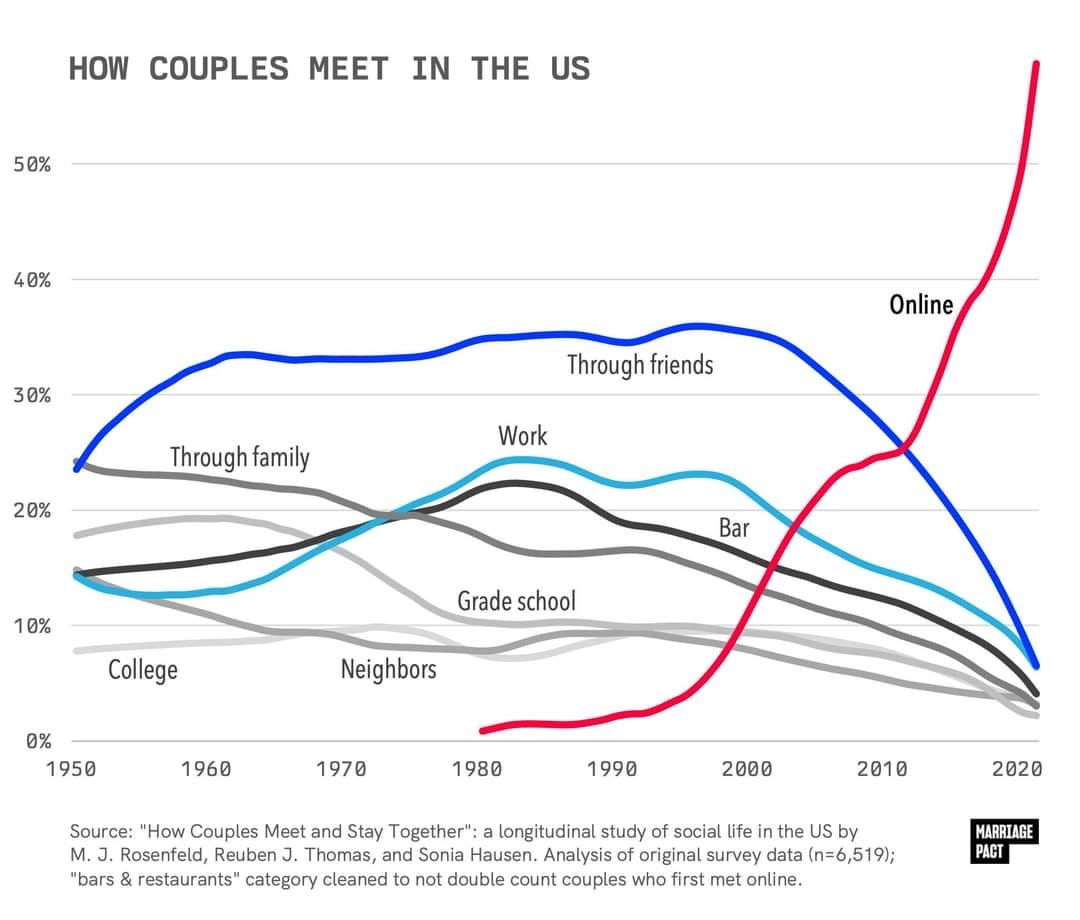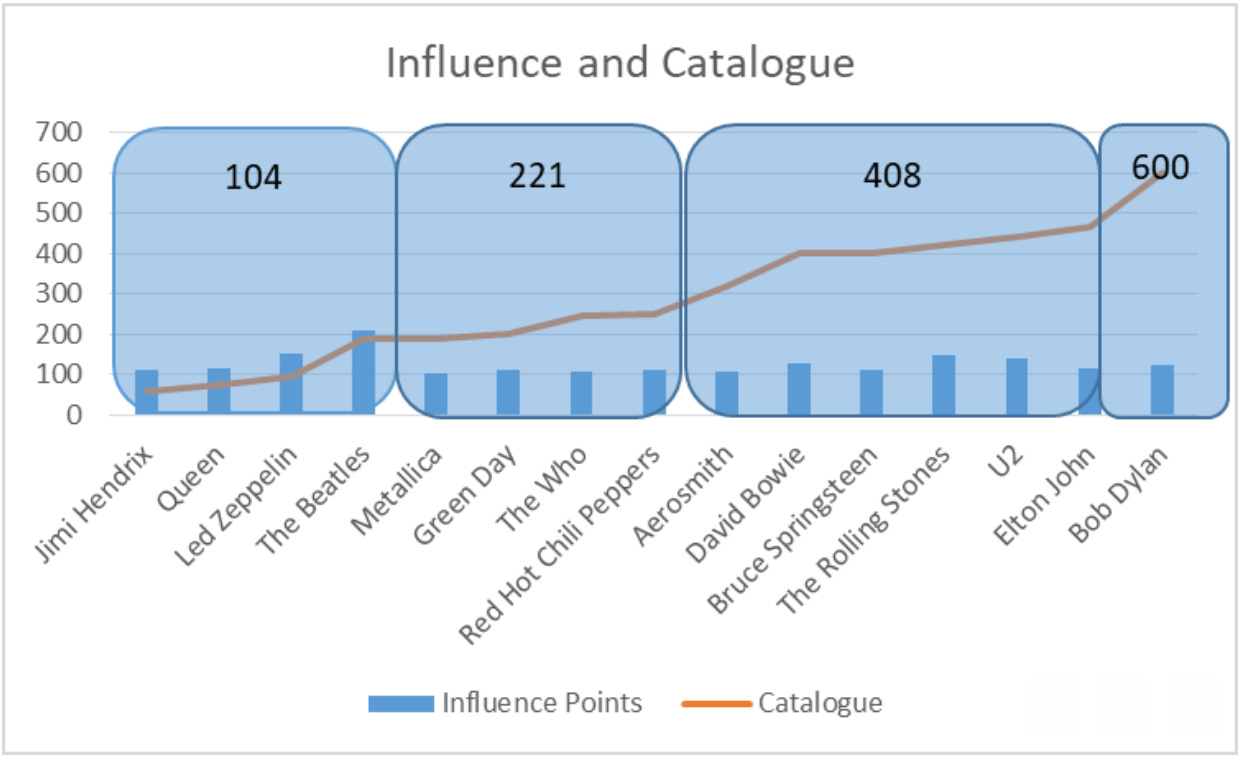You Should Leave Your Home
Sometimes you gotta go out into the cruel, cruel world
Last week’s post on the most influential rock bands got a ton of cool feedback. My favorite piece came from a reader who paired the influence scores with the number of songs that artist had released. Together those two pieces of information give you insight into which artists had the most influence in the shortest timeframe. In this case, Jimi Hendrix is a cut above the rest.
If you have any other thoughts on how to measure artist influence, I’d love to hear them. Now, let’s talk about leaving your house.
You Should Leave Your Home
By Chris Dalla Riva
On Friday night, I went out to eat with my girlfriend and our two friends. It was a cold night, so we decided to pick the closest restaurant possible, in this case the sushi restaurant on the first floor of my apartment building. The commute was all of 35 seconds.
After we sat down, the owner of the restaurant — who I know because he owns a unit in the building — came by to say hello. Amid the pleasantries, he mentioned how much the neighborhood had changed in the 20 years he’d run the restaurant. “People just don’t go out as much anymore,” he told us.
Given that I was sitting in his packed restaurant with three other people, this seemed like a strange comment. It seemed doubly strange when you consider where we live: Hoboken, New Jersey. Hoboken is not only home to a college, but it is known for having lively nightlife. I asked him for clarification.
“20 years ago,” he continued, “every bar in downtown Hoboken would be packed late at night on Mondays during the NFL season. Now, most of those places don’t even open on Monday nights. Nobody would come. Most people have a TV at home as nice as whatever they have in a bar. Why go out and pay $10 for a beer when you could sit at home for a fraction of the price?”
My NFL-loving friend that I was with said that he hadn’t gone out for a Monday night game in years. His 65-inch television and comfortable couch make for a tough argument to leave his house on a Monday. This got me thinking how technology and cultural trends over the last few decades do incentivize us to stay in.
For less than $100 a month, you can have access to the entire history of recorded music, along with thousands of television shows and movies
Should you not want to cook, you can have a DoorDasher bring food from your favorite restaurant right to you
When you want to update your wardrobe, you can have some online retailer drop off a box of clothes at the same stoop your takeout is waiting on
In general, these are good things. I’m in favor of a system that allows me to listen to an obscure 1960s folk album that my friend was telling me about in a matter of moments. I’m in favor of being able to get food dropped off if I’m sick on my couch. I’m in favor of people getting access to goods not in their immediate vicinity. As a matter of principle, I think more choice and information is a positive thing. The problem is that expanded choice and information have been coupled with an asocial component in the 2010s.
Compare how we access much culture and information to how we did just a few decades ago. If you wanted to see a new movie, you had to head to the theater, buy a ticket, and sit there for the next two hours with a group of strangers. If you wanted to buy a new album, you had to head to your local record shop and talk to the clerk while you checked out. If you wanted a new pair of jeans, you had to go to a clothing store. These were necessarily social actions. Now, they don’t have to be.

The thing that always shocks me the most is that you would think there was one space we couldn’t remove the socialization from: dating. Of course, you need to meet someone face-to-face if you want to have a relationship with them. But dating has become so dominated by mobile apps that you can swipe through scores of potential mates without ever seeing them face-to-face.
I think one of the great problems of our time is figuring out how to continue giving people more choices and information without losing the vital social component that has historically been coupled with most actions. Of course, some of this socialization can take place online. I’ve made friends in cyberspace. But I don’t think there’s strong evidence that it’s a true replacement for in-person socialization.
A New One
"Peace of Mind" by Michigander
2024 - Indie Rock
Whereas people have come to see watching a film at home as a substitute for heading to the movie theater, music streaming is not viewed as a replacement for a live concert. That’s a good thing. Live music is one of the most magical things we have in this world.
My current concert white whale is Michigander, a group centered around songwriter Jason Singer. I’ve been following Singer and his group for a few years now but still haven’t gotten to see their compelling brand of indie rock on stage. Hopefully I can correct that in 2025.
An Old One
"Mr. Telephone Man" by New Edition
1984 - Soul
Even in the streaming age, music listening can still be a very social act. In fact, it might be easier to share songs than ever before. Just a few weeks ago, my buddy sent me this song by New Edition, “Mr. Telephone Man.” Built around enchanting harmonies, I understand why he felt compelled to share it with me. When you hear something this good, you’ve got to send it to someone else.
Shout out to the paid subscribers who allow this newsletter to exist. Along with getting access to our entire archive, subscribers unlock biweekly interviews with people driving the music industry, monthly round-ups of the most important stories in music, and priority when submitting questions for our mailbag. Consider becoming a paid subscriber today!
Recent Paid Subscriber Interviews: Pitchfork’s Editor-in-Chief • Classical Pianist • Spotify’s Former Data Guru • Music Supervisor • John Legend Collaborator • Wedding DJ • What It’s Like to Go Viral • Adele Collaborator
Recent Newsletters: Personalized Lies • The Lostwave Story • Blockbuster Nostalgia • Weird Band Names • Recorded Music is a Hoax • A Frank Sinatra Mystery • The 40-Year Test
Want to hear the music that I make? Check out my latest single “Overloving” wherever you stream music.




I only recently started going back to shopping in the record store and holy moly it's changed how I interact with music. A year or two ago I was listening to the same 2-3 playlists on spotify - usually lofi. Now, I'm finding all sorts of things — both old and new. I wish more people would journey out, but at least I always have the people that work at the record store to chat with
In four brief years between 1966 and 1970, Hendrix completely altered the landscape of rock and roll and guitar playing.
Regarding the rest of your post (but on a different note)...
Every week my wife and I have a date night, just the two of us. We usually go out and have dinner and then on to one of our favorite local bars for a couple of drinks, where we enjoy sitting next to each other with no distractions, no TVs, and just talk to each other. Nothing else is important. Just our time together. Our phones are never out.
However, looking around restaurants and bars, most people sitting at tables are on their phones. They are not engaging with the people they are with. They think they are, but they are not. This has become acceptable and normalized, and people don't seem to have a problem with it. But, if either of us were on our phones during our date night, it wouldn't be acceptable. And it's the same if I am out with friends or at a concert. There is a time and place to look at one's phone and when it should be away. I strongly believe one should be present in the company, and space you are in. Regarding the latter, I am also astonished by the number of people who paid for tickets to see an artist perform, and they are on their Instagram, FB, or texting during a show.
But, hey, my wife and I fully accept we are in the minority as the evidence is overwhelming how acceptable it has become in society.